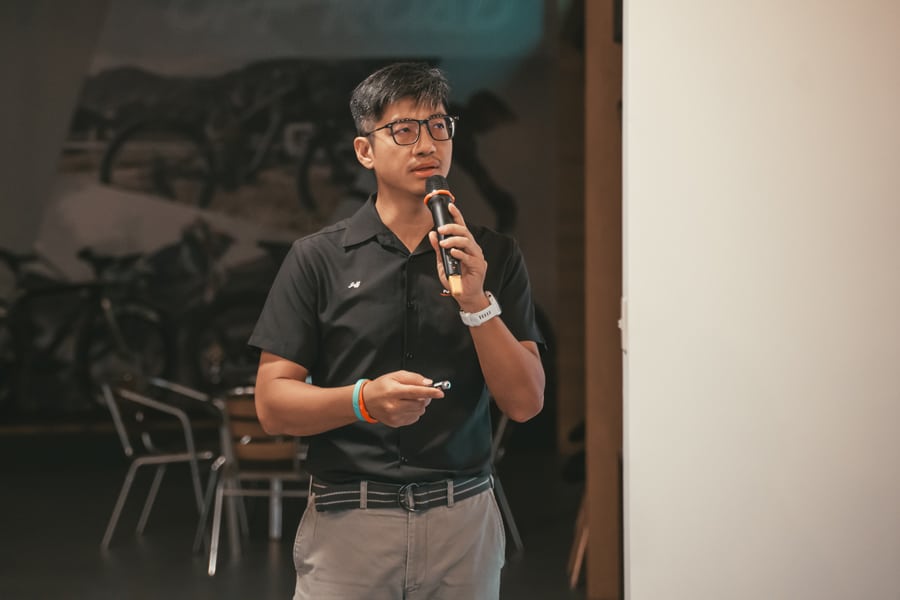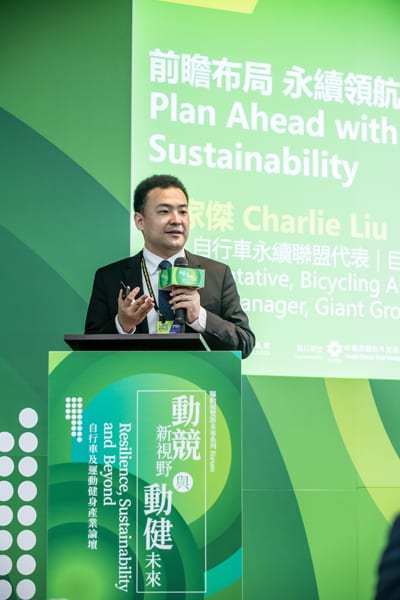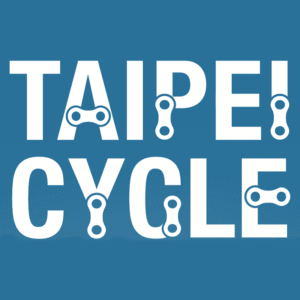Under the leadership of the Giant Group, 33 members of the Taiwanese bicycle industry founded the Bicycling Alliance for Sustainability (BAS) in the fall of 2022. The goal of the initiative is to build a coalition to interact, share ideas, and develop new ESG strategies to help the bicycle industry move towards more sustainable production practices. Show Daily sat down with Charlie Liu (Representative of BAS and Project Manager of Giant Group) and Jeff Chen (General Manager of Novatec and Vice-Chairman of BAS) to discuss the initiative’s progress.

Mr Liu and Mr Chen, the Bicycling Alliance for Sustainability (BAS) was founded nearly 18 months ago. How has the initiative developed since then?
Charlie Liu: Originally, we started with 33 companies. Today, we already have around 80 members – and BAS continues to grow. That shows that the initiative has already achieved one of its primary goals: to raise awareness within the Taiwanese bicycle industry to reduce carbon emissions and ensure sustainable production.
What does the collaboration within the Bicycling Alliance for Sustainability look like?
Jeff Chen: We organise training events for each of these sustainability areas. For instance, over the past few months, we’ve invited experts, universities, consultants, etc., to discuss various sustainability topics. Such events happen roughly every two months. Additionally, we talk about our own activities to learn from each other.
Charlie Liu: One of the BAS’s key goals is to rally the Taiwanese bicycle industry together to share ESG information and learn. That’s why all BAS members are also encouraged to report their progress. This way, we can learn from each other. For example, at one of our last meetings, the topic was recycled material. One company had a lot to report on this – which benefits everyone.
Looking at BAS from the outside, the initiative somewhat reminds one of the earlier Taiwanese industry initiative “A-Team”. Is the principle similar?

Charlie Liu: There are some similarities when it comes to the structure, but they’re entirely separate initiatives. The A-Team centred around advancing Taiwan’s bicycle industry on an industrial level. However, it’s clear that the A-Team laid an essential foundation. Thanks to the collaboration back then, there’s now significant trust between different companies and readiness for inter-brand cooperation, from which we’re benefiting today.
The time BAS has been around is relatively short. Can you already share any success stories?
Jeff Chen: Collaborating in BAS is honestly the best part. Even small actions make a big difference. At Novatec, we committed to eliminating the use of plastic bags for our hub products. This decision required us to overcome numerous challenges, from selecting the optimal packing alternative to integrating this change throughout our entire workflow. Discussing such topics with others who are facing similar challenges can significantly accelerate the process of finding solutions.
The growing number of members indicates a strong desire among companies to become more sustainable. However, BAS is not only an initiative to unite and educate the industry but also has set sustainability goals for its members. What progress do you make here?
Charlie Liu: Absolutely. BAS goes beyond being just a platform; we actively motivate our members to meet precise sustainability targets. For instance, we aim to cut down 25% or 40 kg of CO2 equivalent emissions per bicycle by 2030 and to reduce our carbon footprint by 3% annually. Another objective is to measure our CO2 emissions. We’ve observed significant progress among our members, many of whom are well on their way to achieving these goals. The enthusiasm and quick action from everyone involved is truly remarkable.
How would you describe the status quo when it comes to sustainability actions in the Taiwanese bicycle industry in general?
Charlie Liu: Things are definitely happening. I also believe that Taiwan is very well-positioned to make rapid progress. As an island landscape, our resources are limited, which means that conservation is deeply ingrained in us. I think the bicycle industry knows that it needs to take action, and we are seeing that happen.Jeff Chen: We see that many companies have taken the initial steps; now, it’s critical to proceed with the next ones. One challenge is that more companies understand that investing in ESG and sustainability isn’t just a commitment; it’s a smart business strategy. That’s exactly where our focus should be. Instead of seeing sustainability as a limitation, we should view it as a valuable opportunity. Even though these initiatives might need initial investments, the advantages they bring are significantly greater.


